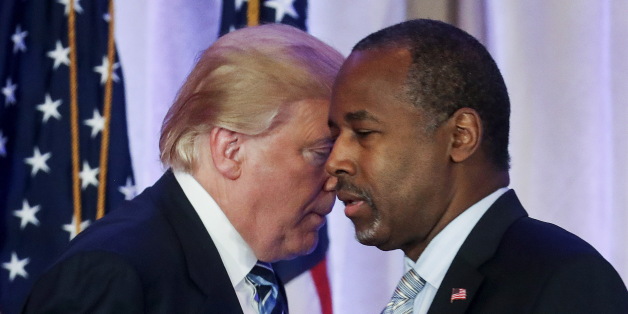
Right wingers have long accused Muslim leaders of not speaking out against ISIS—and they’ve long been wrong. At the end of last year, a meeting of great minds on Fox News between Sean Hannity — who earlier that day had said “moderate Muslims don’t speak out enough against the hijacking of their religion” — and Ben Carson, Donald Trump’s new second best friend (don’t worry, Gov. Christie, you’re still his bestie) produced this pile of, er, wisdom:
BEN CARSON: Now, what we need to do, I think, is encourage the imams and the clerics to come out and condemn the radical elements of that faith, because if they can —
SEAN HANNITY (HOST): Do you think the more moderate elements in Islam have been too silent in the face of all —
CARSON: Absolutely.
HANNITY: — of these terror attacks, cumulatively speaking?
CARSON: [snip] somebody needs to come out and make that distinction, because we need to have a way of being able to tell who our friends and who our friends are not.
Here’s a thought for Mr. Carson, one he can perhaps pass along to his new boss at Trump campaign headquarters—you know, the guy who in January announced that Syrian refugees “could be ISIS ... probably are ISIS:” Our friends are the Muslim leaders who’ve been condemning ISIS so strongly and effectively that the organization has put their names on a hit list. How’s that for making a distinction between ISIS and the Islam practiced by the overwhelming majority of Muslims?
Sheikh Hamza Yusuf, an American Muslim scholar based in Berkeley, Calif., has pleaded with Muslims not to be deceived by the “stupid young boys” of the Islamic State. Millions have watched excerpts from his sermon titled “The Crisis of ISIS,” in which he wept as he asked God not to blame other Muslims “for what these fools amongst us do.”
Just three days after the vicious ISIS attack on Brussels that killed 32 people, Tennessee-based Sheikh Yasir Qadhi delivered a powerful rebuke at an East London mosque, one of the largest in Europe: “None of our senior scholars of any school — any school — has justified these deeds.”
ISIS recently issued death sentences to 11 imams—and this is not the first time it has put out a call to assassinate Muslim American leaders who have spoken out against it. ISIS published the 11 names in Dabiq, its propaganda arm, branded them “obligatory targets,” and called on its followers to employ whatever methods possible in order to “make an example of them.” The FBI has gotten involved, offering its help to protect some of the threatened imams. None of them have any intention of stopping their anti-ISIS campaign.
Washington-based Imam Husain Webb, whose “ISIS and ice cream” webcasts—the conversations take place in ice cream parlors and the name is intended as an insult to ISIS—declared: “It’s an honor to be denounced by ISIS. I consider it one of my greatest accomplishments in life. It has only reinvigorated me to provide the antivenom to the poison of ISIS.”
And it’s not just American Muslims. This January, the Marrakesh Declaration condemned jihadi violence and terror. It specifically rejected “criminal groups [who] issue edicts attributed to Islam,” noting that they “in fact, alarmingly distort [Islam’s] fundamental principles and goals.” Additionally, the declaration—which was also endorsed by the Organization of Islamic Cooperation, founded by and representing the governments of 57 Muslim-majority countries—closed by stating that its adherents:
Call upon representatives of the various religions, sects and denominations to confront all forms of religious bigotry, villification, and denegration of what people hold sacred, as well as all speech that promote hatred and bigotry; AND FINALLY,
AFFIRM that it is unconscionable to employ religion for the purpose of aggressing upon the rights of religious minorities in Muslim countries.
Is that speaking out “enough” for Mr. Hannity and Mr. Carson? If not, they can talk to the family of Samahan Abdel-Aziz. In the city of Aden, Yemen, Mr. Abdel-Aziz preached against the extremism of ISIS and al-Qaeda. He was kidnapped the next day. Two days after delivering the sermon, his body was found.
We cannot allow right-wing lies about Muslims to take root. It is important for Muslim leaders to condemn crimes committed in the name of their faith, and they have done so—at great risk—both at the individual and institutional level, both in the West and in Muslim countries.
The brand-new mayor of London, Sadiq Khan, is now the most important Muslim elected official in the Western world, and an incredibly powerful example of Muslim integration. Here’s how he put it: “Daesh, ISIS, all those guys, hate the fact that I am mayor of London. Why? Because it contradicts what they say, which is that Western liberal values are incompatible with Islam.” Londoners, he added, “chose unity over division, and a rejection of the politics of fear.”
Finally, Mr. Khan rightfully pointed out that those on the right who stoke fear about Islam—who consider all Muslims to be, paraphrasing Mr. Trump, “probably” terrorists—are the ones making things worse. Trump is, in Khan’s words, “playing into the hands of extremists.”
The most important question now is whether we will put the fate of our country into the hands of Donald Trump.


